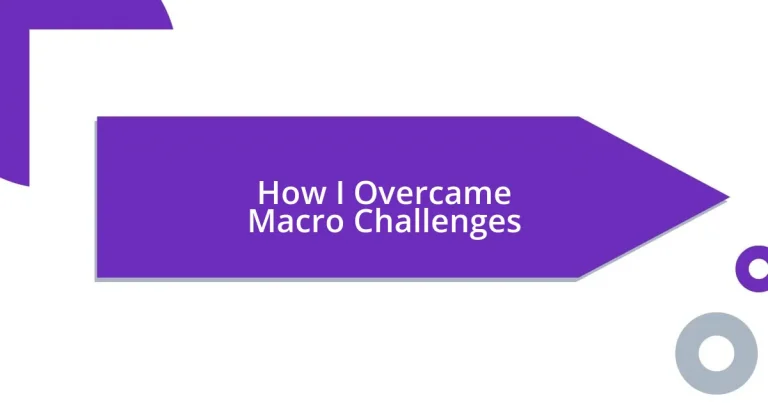Key takeaways:
- Recognizing macro challenges involves a balance of awareness and resilience, transforming obstacles into growth opportunities.
- Building a support network is crucial, offering emotional reassurance and shared problem-solving during tough times.
- Tracking progress and making adjustments based on feedback create clarity and improve team dynamics and outcomes.
- Celebrating wins and reflecting on lessons learned fosters motivation and strengthens team spirit, serving as a roadmap for future success.
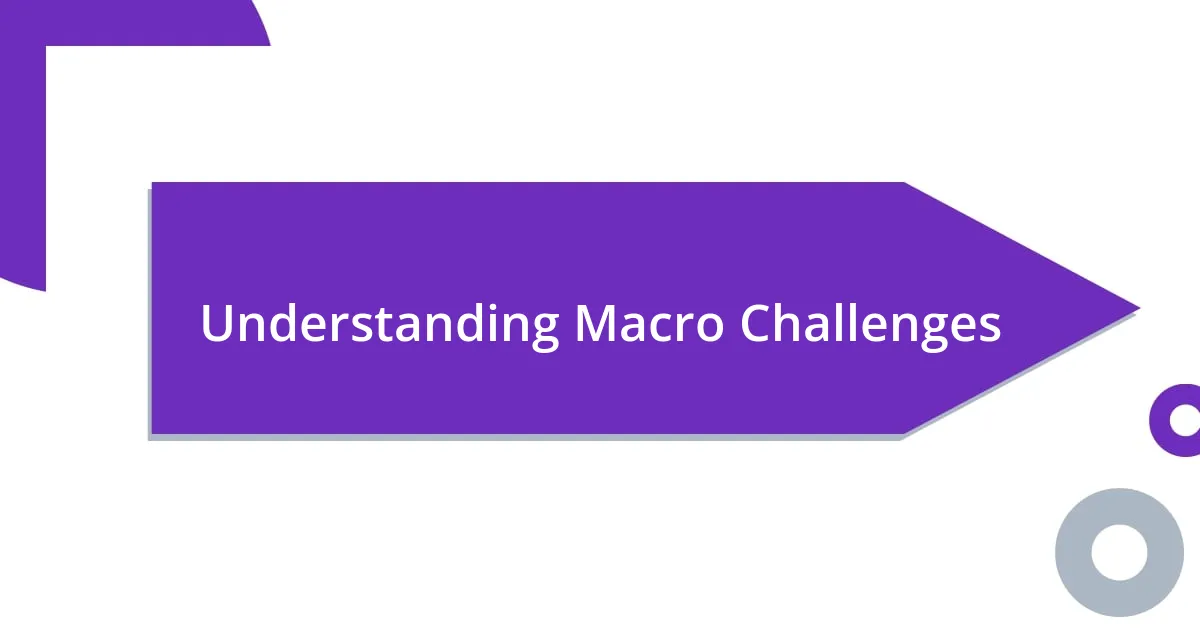
Understanding Macro Challenges
Macro challenges often feel overwhelming, don’t they? At one point, I faced what seemed like a mountain of obstacles in my career. The pressures of market fluctuations and shifting consumer behaviors were relentless, making me question my decisions daily.
When I think of macro challenges, I recall a time when the global economy took a downturn, and it hit my industry hard. I felt a sense of panic, surrounded by colleagues who mirrored my anxiety. Was there a way to navigate these turbulent waters without losing sight of our goals? The truth is, recognizing these challenges requires a balance of awareness and resilience.
I’ve learned that understanding macro challenges isn’t just about identifying problems; it’s about embracing the journey. In moments of doubt, I would ask myself, “What’s the lesson here?” This reframing helped me tackle daunting issues with a fresh perspective—transforming what initially felt like insurmountable barriers into stepping stones for growth.
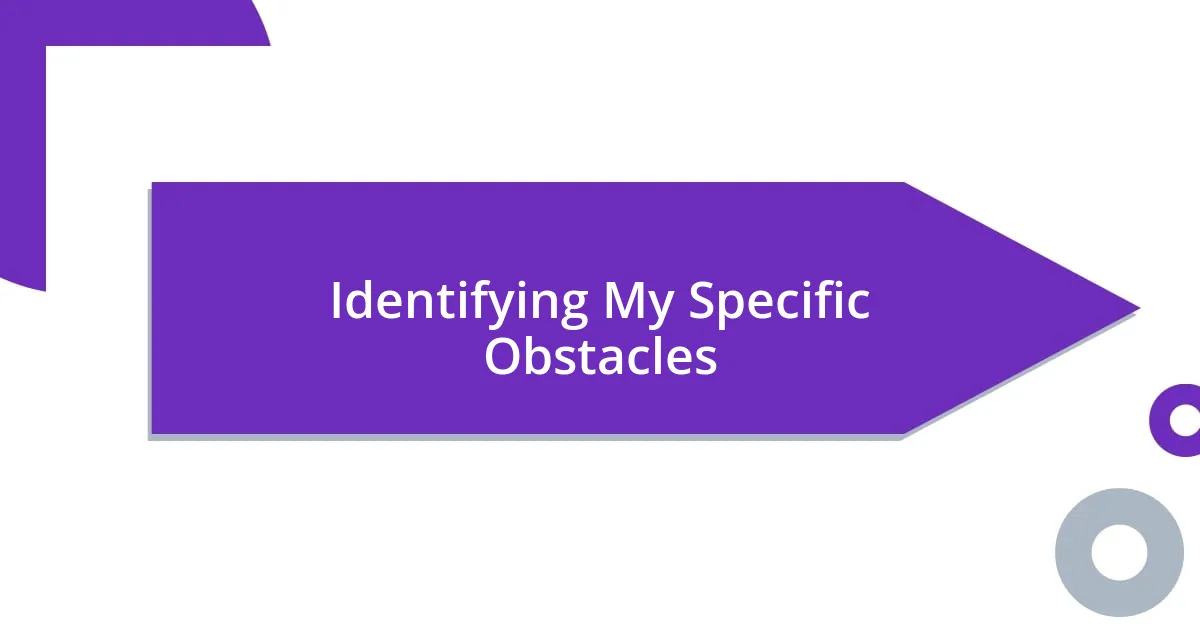
Identifying My Specific Obstacles
Identifying my specific obstacles was an eye-opening experience. I vividly remember the moment I sat down with a notepad and started listing out the hurdles I faced. It was a simple act, but something clicked—the chaos that once felt all-consuming began to take shape. I realized that pinpointing each obstacle not only made them feel more manageable but also empowered me to create actionable strategies.
Reflecting on my career, I discovered that my challenges were not just external forces; many stemmed from my own mindset. Fear of failure loomed large, often paralyzing my decision-making. During a critical project, I hesitated to present my ideas, fearing criticism. However, when I acknowledged this fear as one of my obstacles, it marked a turning point. Suddenly, I was no longer just reacting to circumstances; instead, I was actively engaged in deciphering what was holding me back.
I began to see patterns in my obstacles. They were often related to time management and resource allocation. For instance, I constantly underestimated how long tasks would take, impacting deadlines and team morale. By tracking my work hours and reflecting on my inefficiencies, I shaped a more realistic approach to my projects. This revelation transformed my workflow and boosted my confidence, as I learned to take control of my time rather than letting it slip away.
| Obstacle | Insights |
|---|---|
| Market Fluctuations | Realized the need to embrace adaptability and stay informed. |
| Fear of Failure | Identifying this fear allowed me to confront it and engage more actively in projects. |
| Poor Time Management | Tracking my work habits helped me create a more effective planning strategy. |
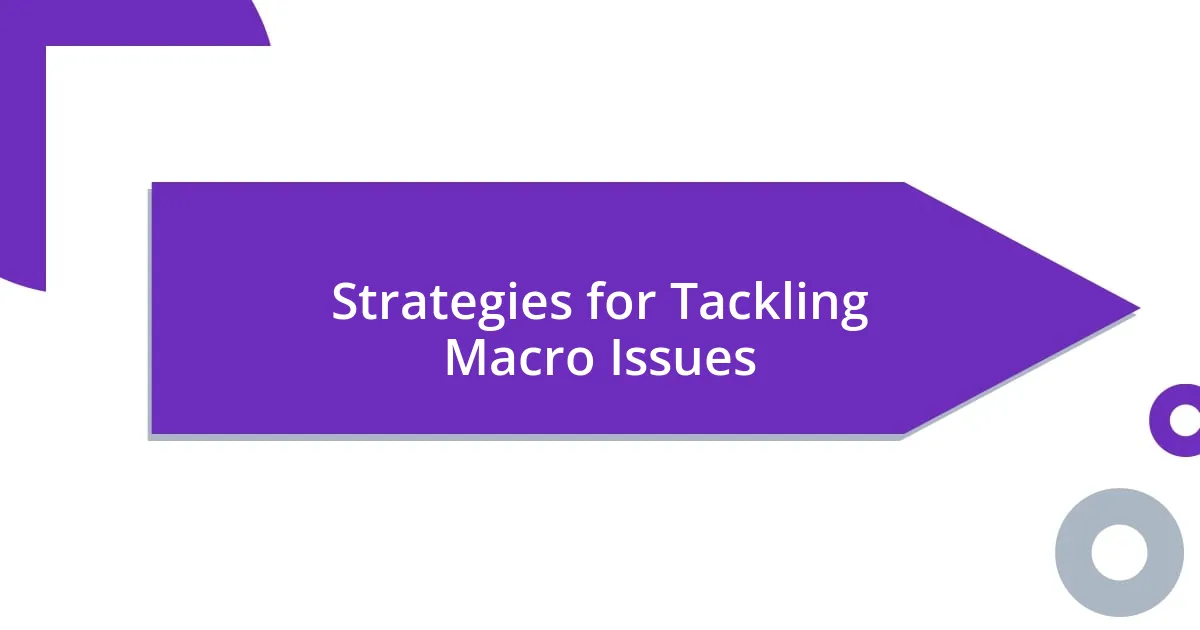
Strategies for Tackling Macro Issues
Navigating macro challenges requires a toolbox of strategies that can adapt to the ever-shifting landscape. Over the years, I’ve found that developing a proactive mindset is crucial. Instead of waiting for problems to arise, I learned to anticipate them. For instance, during a project that involved multiple stakeholders, I implemented regular check-ins. These not only kept team members aligned but also allowed us to identify potential roadblocks early on. It felt invigorating to be in control rather than merely reacting to chaos.
Here’s a succinct list of strategies that worked for me:
- Embrace Continuous Learning: Staying informed about industry trends helps you stay ahead of macro challenges.
- Foster Open Communication: Encourage a culture where team members can share concerns without fear, promoting early problem identification.
- Set Clear Goals: Break larger objectives into smaller, achievable tasks to maintain focus during turbulent times.
- Cultivate Resilience: Recognize that setbacks are part of the journey and use them as learning opportunities.
- Utilize Data-Driven Insights: Leverage analytics to make informed decisions, helping to anticipate market changes before they hit.
Implementing these strategies made me feel empowered and better equipped to tackle macro challenges. It’s fascinating how shifting my approach and mindset ended up being just as impactful as the strategies themselves. I recall the first time I faced a sudden market shift; instead of panicking, I remembered to rely on my gathering of insights and strategies, which eased my discomfort and allowed me to act decisively.
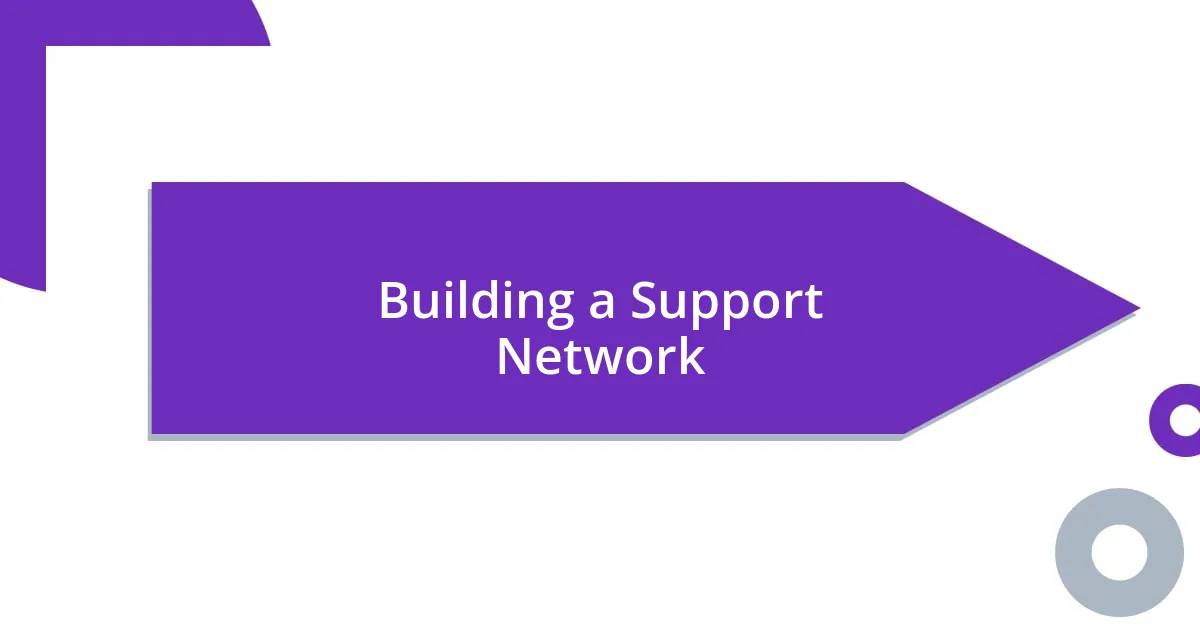
Building a Support Network
Building a support network is a game-changer when tackling macro challenges. I used to think I could do it all myself, but that mentality quickly led to burnout. Once I started reaching out—to mentors, colleagues, and even friends—I felt an immediate relief. It’s like having a safety net; you know you’re not alone and can share your burdens with others who understand your struggles.
I vividly remember a time when I was grappling with a particularly tough project deadline. I felt completely isolated in my efforts. During a coffee chat with a former colleague, I shared my stress, and she opened up about similar experiences. Her advice? “Don’t hesitate to lean on your team.” It struck me. Why wasn’t I utilizing the resources right in front of me? That conversation ignited a shift; I began actively seeking collaboration, turning what felt like a mountain into manageable hills.
Another key aspect of building a support network is fostering genuine relationships. I often ask myself—how can I help others in my network? By being supportive, I found that connections deepened, leading to an environment where we could all thrive. When times got tough, having those bonds made it easier to navigate challenges together. The emotional reassurance and shared problem-solving became invaluable assets in my journey. What about you? Have you considered the power of your own support network? It can truly transform how you face challenges.
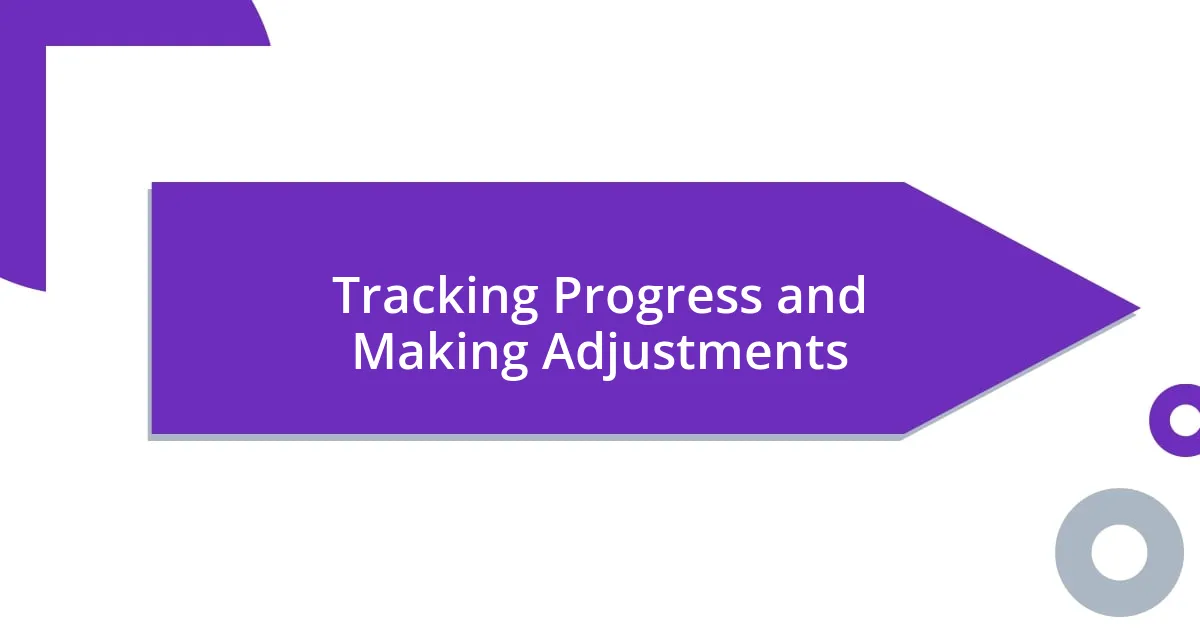
Tracking Progress and Making Adjustments
Tracking progress is essential to navigating macro challenges, and I’ve learned this firsthand. I used to rely on gut feelings alone, but over time, I realized that measuring outcomes provides clarity and direction. For instance, during a complex project, I introduced a shared dashboard to track our progress and performance metrics. It was rewarding to see our achievements laid out visually, which not only kept us motivated but also highlighted areas that needed our attention.
Making adjustments is just as crucial as tracking. Once, I encountered a major setback when a key strategy backfired. Instead of dwelling on it, I gathered the team and encouraged everyone to share insights. This transparent environment allowed us to brainstorm alternative approaches swiftly. I asked, “What can we learn from this?” and found that this simple question transformed our energy into proactive solutions, steering us back on course.
Regulating my expectations helped me make necessary adjustments along the way. At one point, I overestimated our team’s capacity and felt overwhelmed when goals weren’t met. A candid conversation with my team revealed their thoughts on pacing the workload. This input was invaluable. I learned that being flexible and open to changing our plans can lead to more sustainable success. So, how do you ensure you stay on track and adapt when challenges arise? Embracing feedback can be a game-changer.
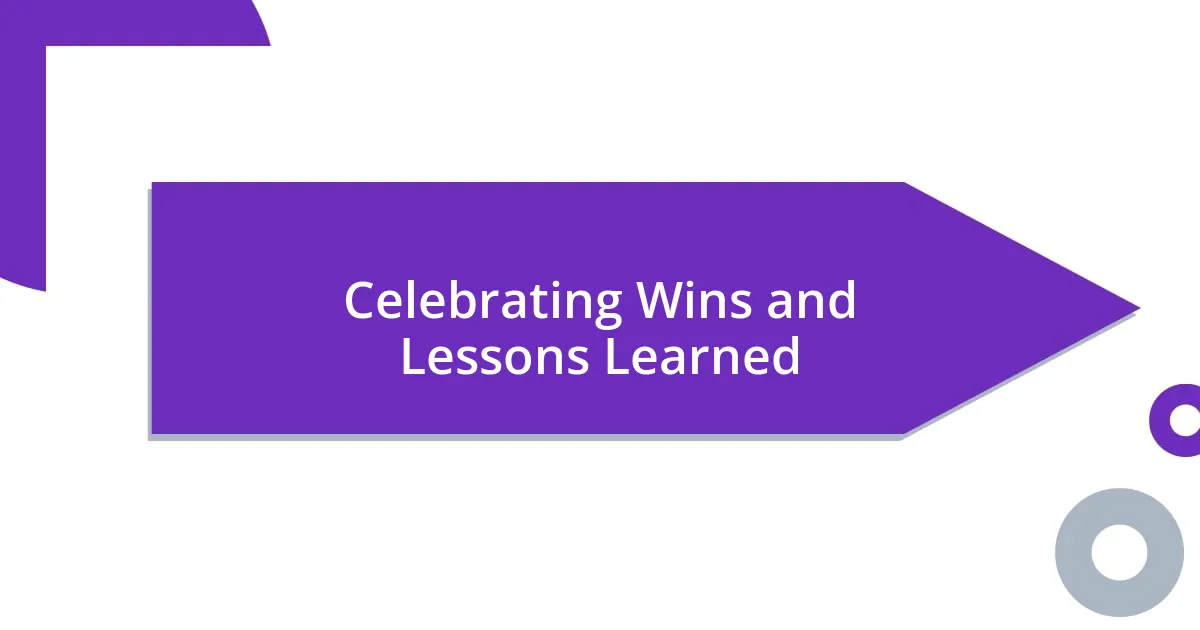
Celebrating Wins and Lessons Learned
Celebrating wins has become a crucial part of my journey, serving as both recognition and motivation. I remember a time when our team completed a project ahead of schedule. We decided to celebrate with a small gathering, and it was so uplifting to see everyone share their unique contributions. In that moment, I realized it’s not just about the end goal; it’s about acknowledging the effort and collaboration behind it. Have you taken the time to celebrate your own milestones? I encourage you to do so — it fosters a positive atmosphere and strengthens team spirit.
On the flip side, reflecting on lessons learned has profoundly shaped my approach to challenges. After a particularly ambitious initiative fell short of expectations, I gathered the team for a roundtable discussion. I was surprised at how open everyone was to share their thoughts and feelings about the experience. It was healing to explore what went wrong together, turning disappointment into insight. I often ask myself, “What’s the silver lining here?” And I find that focusing on the lessons learned transforms setbacks into stepping stones for future success.
Integrating both celebration and reflection into my routine has been enlightening. I now keep a “win journal,” where I jot down achievements, big and small, along with lessons learned from each experience. The act of writing it down not only reinforces the positive aspects but also serves as a reminder of how far I’ve come. Have you ever considered tracking your wins and the lessons that follow? It’s like having a personal roadmap that guides me forward, and I invite you to create yours.
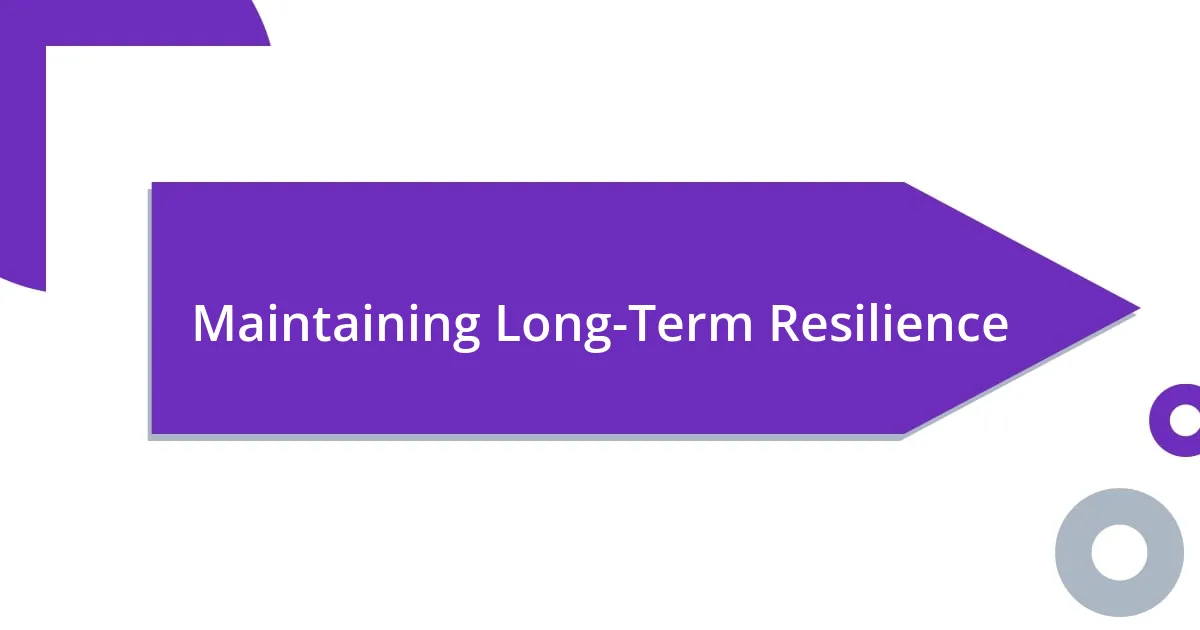
Maintaining Long-Term Resilience
Maintaining long-term resilience requires a mindset shift that I discovered through experience. Early on, I faced a daunting period of fluctuating progress in a project where the stakes were high. It felt discouraging at times, but I learned that focusing on small, incremental wins can build a foundation of resilience. Have you found that celebrating the little things can reignite your motivation? For me, it was a game-changer.
I also realized that forming a support network significantly boosts resilience. During a challenging phase in my career, I reached out to a few trusted colleagues to share what I was going through. Their diverse perspectives not only provided encouragement but also equipped me with fresh strategies to tackle my challenges head-on. I often ponder how valuable it is to connect with others when faced with adversity. Have you considered who your support network could be in tough times?
Finally, I’ve discovered that self-care plays a pivotal role in sustaining resilience. There were moments when I devoted so much energy to work that I neglected my well-being. Once, a friend called me out on it during a candid conversation. I began to prioritize activities that recharge me, such as hiking or simply carving out quiet time for reflection. It made a world of difference in my perspective and overall stamina. So, how are you nurturing your own resilience? Taking care of yourself isn’t just beneficial; it’s essential.












